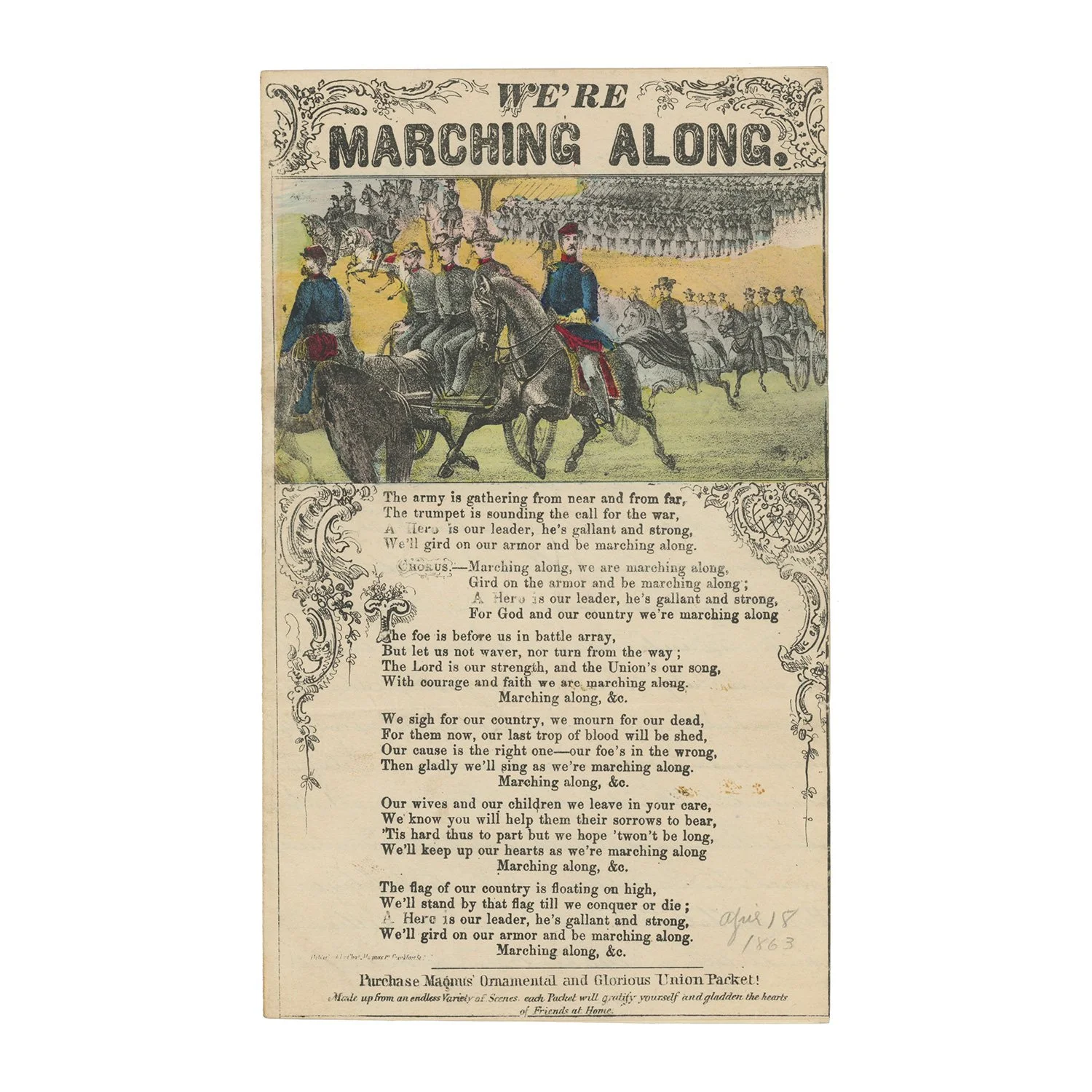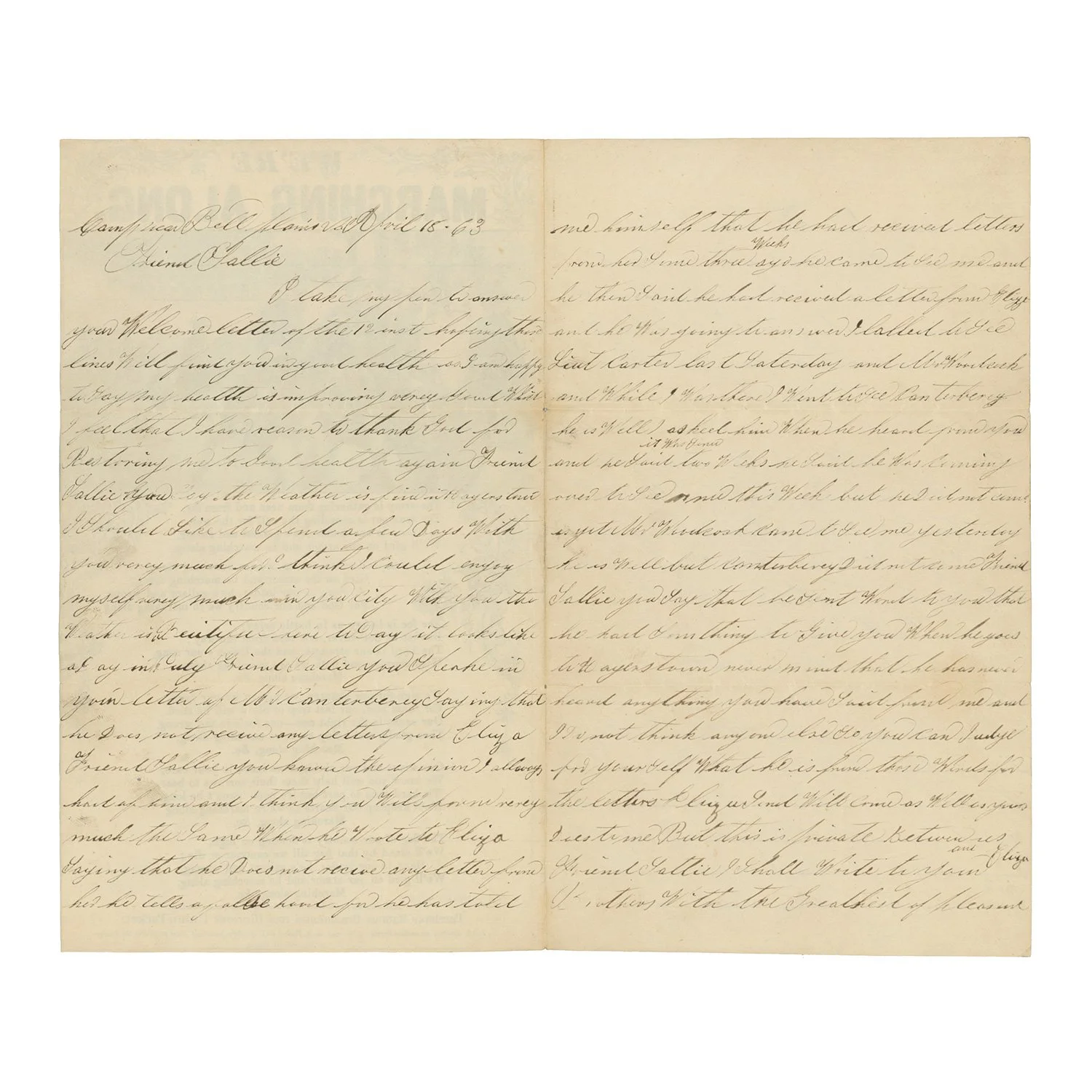1863 Union Soldier's Letter — Days Before Chancellorsville — “They say the Rebs are trying to get into Maryland again, but I hope it is not true" — Written on Magnus "Marching Along" Songsheet
1863 Union Soldier's Letter — Days Before Chancellorsville — “They say the Rebs are trying to get into Maryland again, but I hope it is not true" — Written on Magnus "Marching Along" Songsheet
Item No. 5953618
This revealing letter is written by an unidentified Union soldier stationed near Belle Plaines, Virginia, on April 18, 1863. Penned to “Friend Sallie” in Hagerstown, Maryland, the letter provides an excellent example of the intimate, personal correspondence exchanged during the war—mixing health updates, interpersonal drama, and commentary on military movements, including the rumors of another Rebel invasion of Maryland and the failure of Union forces to retake Fort Sumter in Charleston Harbor.
The writer opens with news that his health is improving and expresses a desire to spend time with Sallie in Hagerstown. “I should like to spend a few days with you very much,” he writes, “for I think I could enjoy myself very much in your city with you.” An intriguing portion of the letter revolves around a man named Mr. Canterbury, who is accused of dishonesty regarding correspondence with a woman named Eliza. The author minces no words in his opinion of Canterbury, stating bluntly, “when he wrote to Eliza saying that he does not receive any letter from her he tells a falsehood, for he has told me himself that he had received letters from her…”
The letter closes with remarks on army movements and strategic uncertainty in the days prior to the Battle of Chancellorsville. The soldier notes they were ordered to prepare eight days’ rations, suggesting an imminent move—he believed likely to Maryland or Washington. He adds, “the sick in the Hospital are all taken away this morning,” and expresses concern over Confederate activity. “They say the Rebs are trying to get into Maryland again, but I hope it is not true.” He also references the recent failure at Fort Sumter, writing, “I am sorry to hear that our noble fellows have failed in their attempt at Fort Sumter, but I hope they will succeed the next time they advance on there and get this dreadful war at an end” Here he refers to the Union Navy’s failed ironclad assault on Charleston Harbor on April 7, 1863. The soldier concludes, “it looks now as if [the war] was going to last for two years more if they do not move more lively than they do now.”
It then ends rather abruptly and is unsigned, suggesting that perhaps there was a second sheet at one time.
The letter was written on three pages of a 4-page Magnus letter sheet measuring about 5” x 8”. It colorfully depicts the advance of Union infantry and artillery above the lyrics to the popular tune “Marching Along.” Creased at the original tones. Light toning. The full transcript follows.
Camp near Belle Plaines, Va. April 18, 63
Friend Sallie
I take my pen to answer your welcome letter of the 12 inst., hoping these lines will find you in good health, as I am happy to say my health is improving very good, what I feel that I have reason to thank God for restoring me to good health again. Friend Sallie, you say the weather is fine in Hagerstown. I should like to spend a few days with you very much, for I think I could enjoy myself very much in your city with you. The weather is beautiful here today. It looks like a day in July.
Friend Sallie, you spoke in your letter of Mr. Canterbury saying that he does not receive any letters from Eliza. Friend Sallie, you know the opinion I always have of him and I think you will form very much the same. When he wrote to Eliza saying that he does not receive any letter from her he tells a falsehood, for he has told me himself that he had received letters from her some three weeks ago. He came to see me and he then said he had received a letter from Eliza, and he was going to answer. I called to see Lieut. Carter last Saturday and Mr. Woodcock, and while I was there I went to see Canterbury. He is well. I asked him when he heard from you and he said it was just two weeks. He said he was coming over to see me this week, but he did not come as yet. Mr. Woodcock came to see me yesterday. He is well, but Canterbury did not come. Friend Sallie, you say that he sent word to you that he had something to give you when he goes to Hagerstown. Never mind that he has never heard anything you have said from me and I do not think anyone else, so you can judge for yourself what he is from those words, for the letters Eliza send will come as well as yours does to me. But this is private between us. Friend Sallie, I shall write to your and Eliza’s Brothers with the greatest of pleasure before long.
I do not think we will remain here long. Last Wednesday we were ordered to have 8 days rations, five days in our knapsacks and three days in our haversack. But a rain storm came out, which put a stop to the move. But I think we will move from here on Monday. The sick in the Hospital are all taken away this morning. They say the Rebs are trying to get into Maryland again, but I hope it is not true. I believe we will either go to Maryland or Washington. I hardly think they will cross the river again to Fredericksburg. I am sorry to hear that our noble fellows have failed in their attempt at Fort Sumter, but I hope they will succeed the next time they advance on there and get this dreadful war at an end. But it looks now as if it was going to last for two years more if they do not move more lively than they do now.



